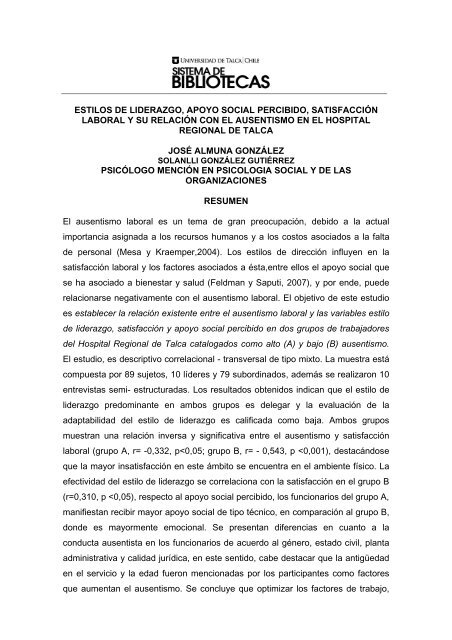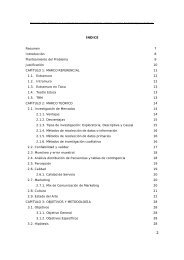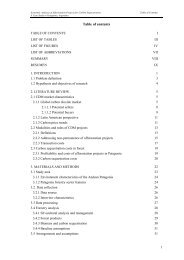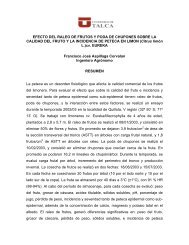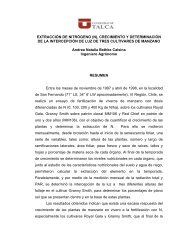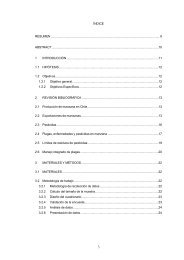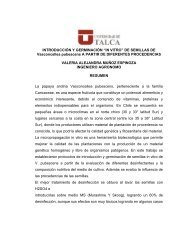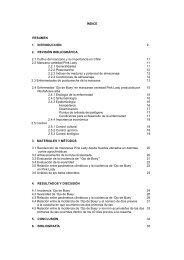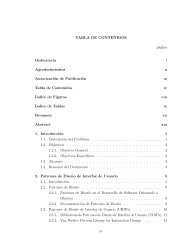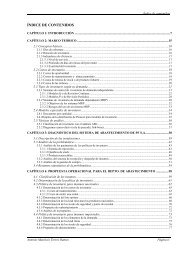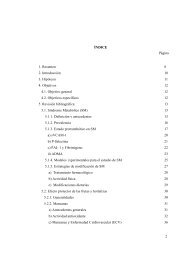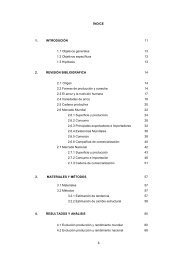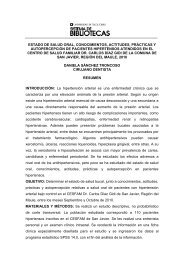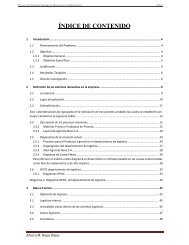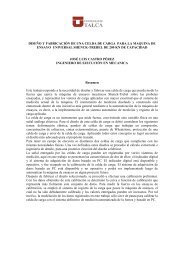estilos de liderazgo, apoyo social percibido, satisfacción laboral y su ...
estilos de liderazgo, apoyo social percibido, satisfacción laboral y su ...
estilos de liderazgo, apoyo social percibido, satisfacción laboral y su ...
Create successful ePaper yourself
Turn your PDF publications into a flip-book with our unique Google optimized e-Paper software.
ESTILOS DE LIDERAZGO, APOYO SOCIAL PERCIBIDO, SATISFACCIÓN<br />
LABORAL Y SU RELACIÓN CON EL AUSENTISMO EN EL HOSPITAL<br />
REGIONAL DE TALCA<br />
JOSÉ ALMUNA GONZÁLEZ<br />
SOLANLLI GONZÁLEZ GUTIÉRREZ<br />
PSICÓLOGO MENCIÓN EN PSICOLOGIA SOCIAL Y DE LAS<br />
ORGANIZACIONES<br />
RESUMEN<br />
El ausentismo <strong>laboral</strong> es un tema <strong>de</strong> gran preocupación, <strong>de</strong>bido a la actual<br />
importancia asignada a los recursos humanos y a los costos asociados a la falta<br />
<strong>de</strong> personal (Mesa y Kraemper,2004). Los <strong>estilos</strong> <strong>de</strong> dirección influyen en la<br />
<strong>satisfacción</strong> <strong>laboral</strong> y los factores asociados a ésta,entre ellos el <strong>apoyo</strong> <strong>social</strong> que<br />
se ha asociado a bienestar y salud (Feldman y Saputi, 2007), y por en<strong>de</strong>, pue<strong>de</strong><br />
relacionarse negativamente con el ausentismo <strong>laboral</strong>. El objetivo <strong>de</strong> este estudio<br />
es establecer la relación existente entre el ausentismo <strong>laboral</strong> y las variables estilo<br />
<strong>de</strong> li<strong>de</strong>razgo, <strong>satisfacción</strong> y <strong>apoyo</strong> <strong>social</strong> <strong>percibido</strong> en dos grupos <strong>de</strong> trabajadores<br />
<strong>de</strong>l Hospital Regional <strong>de</strong> Talca catalogados como alto (A) y bajo (B) ausentismo.<br />
El estudio, es <strong>de</strong>scriptivo correlacional - transversal <strong>de</strong> tipo mixto. La muestra está<br />
compuesta por 89 <strong>su</strong>jetos, 10 lí<strong>de</strong>res y 79 <strong>su</strong>bordinados, a<strong>de</strong>más se realizaron 10<br />
entrevistas semi- estructuradas. Los re<strong>su</strong>ltados obtenidos indican que el estilo <strong>de</strong><br />
li<strong>de</strong>razgo predominante en ambos grupos es <strong>de</strong>legar y la evaluación <strong>de</strong> la<br />
adaptabilidad <strong>de</strong>l estilo <strong>de</strong> li<strong>de</strong>razgo es calificada como baja. Ambos grupos<br />
muestran una relación inversa y significativa entre el ausentismo y <strong>satisfacción</strong><br />
<strong>laboral</strong> (grupo A, r= -0,332, p
logrará generar ambientes más confortables y seguros, lo cual inci<strong>de</strong> en la<br />
<strong>satisfacción</strong> <strong>laboral</strong>, en la institución y en el u<strong>su</strong>ario <strong>de</strong> la atención <strong>de</strong> salud<br />
(Fernán<strong>de</strong>z y Paravic, 2003).<br />
Palabras Clave: Ausentismo Laboral, Satisfacción, Apoyo Social Percibido,<br />
Li<strong>de</strong>razgo
ABSTRACT<br />
Absenteeism is an is<strong>su</strong>e of great concern, given the current emphasis on human<br />
resources and costs associated with lack of personnel (Mesa and Kraemper,<br />
2004). Lea<strong>de</strong>rship styles affect job satisfaction and its associated factors, including<br />
<strong>social</strong> <strong>su</strong>pport was associated with welfare and health (Feldman and Saputi, 2007),<br />
and thus may negatively associated with absenteeism. The aim of this study is to<br />
establish the relationship between absenteeism and lea<strong>de</strong>rship style variables,<br />
satisfaction and perceived <strong>social</strong> <strong>su</strong>pport in two groups of workers at the Hospital<br />
Regional <strong>de</strong> Talca classified as high (A) and low (B) absenteeism. The study is<br />
<strong>de</strong>scriptive correlational - mixed-type cross. The sample is composed by 89<br />
<strong>su</strong>bjects, 10 lea<strong>de</strong>rs and 79 <strong>su</strong>bordinates, also 10 interviews were conducted semistructured.<br />
The re<strong>su</strong>lts indicate that the predominant lea<strong>de</strong>rship style in both<br />
groups is to <strong>de</strong>legate and evaluate the <strong>su</strong>itability of lea<strong>de</strong>rship style is <strong>de</strong>scribed as<br />
low. Both groups showed a significant inverse relationship between absenteeism<br />
and job satisfaction (group A, r = - 0.332, p


